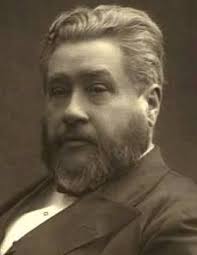Your weekly Dose of Spurgeon
The PyroManiacs devote some space each weekend to highlights from the lifetime of works from the Prince of Preachers, Charles Haddon Spurgeon. The following excerpt is from the The Sword and the Trowel, May, 1883, "The use of wool in the ears."

"It will be a mark of wisdom to be impatient with the follies of human converse."
We are told
concerning Bernard of Clairvaux that, after he had given himself
up entirely to contemplation and walking with God, he met with a considerable
difficulty in the visits of those friends who were still in the world. Their conversation brought back thoughts and feelings connected with the
frivolities which he had for ever forsaken; and on one occasion, after he
had been wearied with the idle chit-chat of his visitors, he found himself
unable to raise his heart towards heaven.
When he was engaged in the
exercise of prayer he felt that their idle talk was evidently the cause of his
losing fellowship with God. He could not well forbid his friends coming,
and therefore he prepared himself for their injurious conversation by
carefully stopping his ears with little wads of flax. He then buried his head deep
in his cowl, and though exposed for an hour to their conversation,
he heard nothing, and consequently suffered no injury. He spoke to
each of them some few words for edification, and they went their way.
We
do not suppose that for any great length of time he was much troubled
with such visitors, for he must have been an uncommonly uninteresting
companion. If people once discover that their clatter is lost upon you,
they are not quite so eager to repeat the infliction.
We are
not admirers of Bernard’s monastic severity, but we wish it were possible
to imitate his use of wool, in the spirit if not in the letter. We are all
thrown in the way of persons who will talk; and their talk has in it about as
much solidity as the comet, of which we are told that a thousand square
miles, if condensed and compressed, would go into a thimble or an acorn-cup.
Cowper made an accurate computation of the value of ordinary conversation
when he said, —
“Collect at ev’ning what the day brought forth,
Compress the sum into its solid worth,
And if it weigh the importance of a fly,
The scales are false, or algebra a lie.”
If it
were of any use to these human fog-horns, whose noise so much disturbs
gracious souls, we would reason with them: but, alas, it would be casting
pearls before parrots, who would hop off with them, drop them, and come
back to scream again.
Still, though it may be wasted effort, we would
tell them a little story, which we met with in a tiny book called “Gold
Dust.” “‘ Mother,’ asked a child, 'since nothing is ever lost, where do all
our thoughts go?’ ‘to God,’ answered the mother, gravely, ‘who remembers
them for ever.’ ‘For ever!’ said the child; he leaned his head, and
drawing closer to his mother, murmured, ‘I am frightened!’”
Do you
triflers never feel frightened too? If so, permit this healthy fear to grow; and
remember that idle words are worse than idle thoughts, for they lead
others into evil, and murder good thoughts in those who else might have
quietly meditated.
As the
topics of conversation which are usually intruded upon devout minds are
worthless, if not worse, the best way is to escape from them altogether;
but when this is not possible; oh, would that the gift of deafness could be
conferred upon us! Oh, to protect the drum of the ear with a plate of iron!
Will no one invent us ear-shields?
The process of letting chit-chat go in at
one ear and out at the other is greatly injurious to the brain; and the mere
passage of such traffic through the mind is painful to the spiritual man’s
heart. It would be a far better thing not to let it enter at all.
Could we not
manage, by determinedly introducing holy topics, to become as truly
bores to the foolish talkers as the chatterboxes are to us? or, better still,
could we not turn the flood of conversation into a profitable channel, and
subdue wild tongues to some useful service, as men tame rushing rivulets
and make them turn their mill-wheels? Oh, that it were possible!
How
often, immediately after a holy service, where in heart and mind we have been
carried to the top of Tabor, so that we have beheld the transfiguration
of all gracious truth, have we come down to the foot of the mountain
to meet with very fools! They have inane remarks to offer upon the
congregation, the faults of the singing, the mistakes of the preacher, or other
worthless trifles. They behave as if, in the presence of God, and heaven,
and hell, they found a fit place for acting the merry-andrew, and playing
their fantastic tricks.
If they have ever been in the presence of the King of
kings, they have been more engrossed by the dust beneath his feet than with
his majesty and glory. This dust they bring away, and throw into our eyes,
so that with the pain thereof the holy vision vanishes away. Oh, that such
beings should exist!

No comments:
Post a Comment